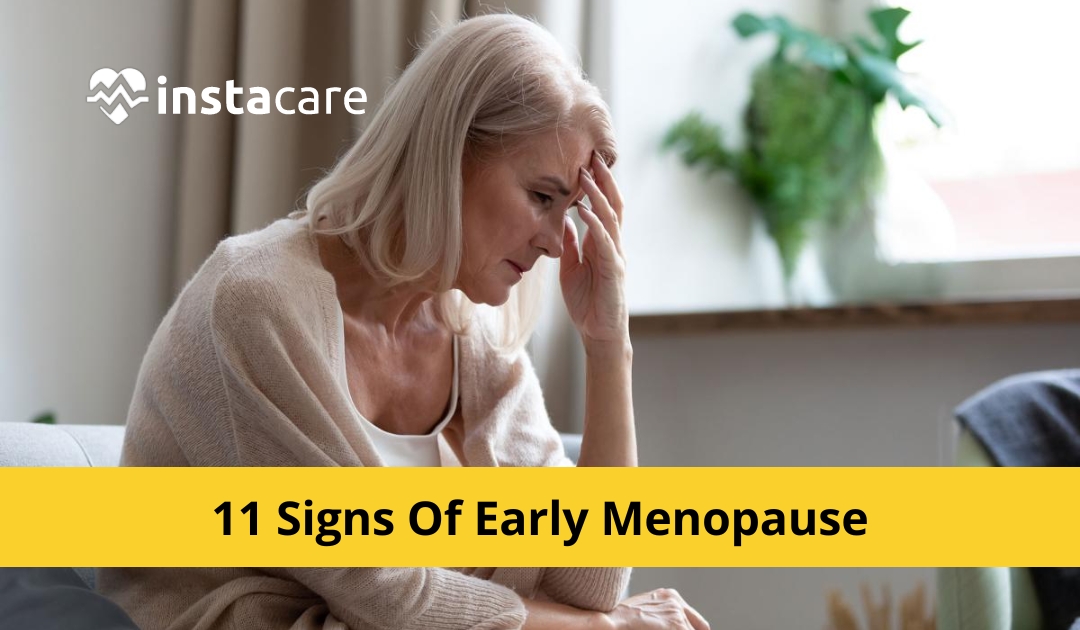Unbeknownst to many, menopause can happen as early as your twenties or thirties. Though the average age for women to experience menopause is 51, for some it can come much sooner. While there are numerous signs of early menopause such as changes in hormonal levels and menstrual patterns, many don't recognize these symptoms until it's too late. In this blog post we will cover everything you need to know about the signs of early menopause so you can be aware of what your body may be telling you before experiencing any significant life alterations due to hormone imbalances.
1- Unpredictable menstrual cycles
Menstrual cycles can be unpredictable for many reasons, such as stress, changes in weight, or even travel. However, if you have noticed that your cycles have become consistently irregular, it may be a sign of early menopause. Early menopause, or premature ovarian failure, occurs when a woman's ovaries stop producing eggs at an earlier age than usual.
Along with irregular cycles, symptoms of early menopause can include hot flashes, night sweats, vaginal dryness, and mood changes. It is important to talk to your healthcare provider if you are experiencing any of these symptoms and have concerns about your menstrual cycles.
2- Hot flushes
Hot flushes are a common sign of early menopause, but what exactly are they? They are sudden and intense waves of heat that seem to rise up through your body and cause you to break out in a sweat. They can last anywhere from a few seconds to several minutes and can occur at any time of the day or night, making it difficult to get a good night's sleep.
In addition to hot flushes, women experiencing early menopause may also notice other symptoms such as mood swings, vaginal dryness, and irregular periods. If you are experiencing any of these symptoms, it's important to talk to your doctor to determine the best course of action for your health.
3- Night sweats
Night sweats are a common symptom experienced by many women going through early menopause. Although frustrating, experiencing night sweats is a normal part of the menopause transition. These hot flashes can occur at any time throughout the night, leaving you feeling overheated and possibly even drenched in sweat.
If you are experiencing night sweats and other associated signs of early menopause, such as irregular periods and mood swings, it's important to speak with your healthcare provider to determine the best course of action. With proper management, you can alleviate the discomfort and frustration associated with night sweats and transition through this stage of life with ease.
4- Mood swings
Mood swings are a common symptom of early menopause, which can occur as early as a woman's mid-30s. This hormonal shift can cause a rollercoaster of emotions, with sudden changes in mood ranging from feeling elated and happy to feeling irritable and sad. Other signs of early menopause include hot flashes, night sweats, and irregular periods.
While mood swings are a natural part of this transition, they can still be disruptive and uncomfortable. It's important for women experiencing these symptoms to talk to their doctors about possible treatments and lifestyle changes that can help manage them.
5- Vaginal dryness and discomfort during sex
Vaginal dryness and discomfort is a common issue for many women during intercourse. One possible cause of this problem is early onset menopause. Signs of early menopause include hot flashes, mood changes, and changes in menstrual cycles. However, it's important to know that experiencing vaginal dryness during sex does not necessarily mean you're going through early menopause. Other factors like stress, medications, and hormonal imbalances can also contribute to this discomfort.
Fortunately, there are various solutions available to help alleviate this issue, including lubricants, hormone therapy, and lifestyle changes. If you're experiencing vaginal dryness and discomfort during sex, it's important to speak with a healthcare provider to find the best solution for you.
View More: Vaginal Swelling - Causes Symptoms And Treatment
6- Difficulty sleeping
Difficulty sleeping is a common problem that affects many individuals. It can be caused by various factors such as stress, anxiety, and health conditions. However, one possible factor that is often overlooked is early menopause. Women who are going through early menopause may experience difficulty sleeping due to hormonal changes.
Night sweats, hot flashes, and mood swings are all possible signs of early menopause that can disrupt sleep. Therefore, it is important to pay attention to any changes in your body and seek medical advice if you suspect early menopause may be the cause of your difficulty sleeping. By addressing this underlying issue, you can improve your quality of life and get the restful sleep that you deserve.
7- Weight gain
Weight gain can be caused by a variety of factors, one of which is early menopause. In fact, one of the earliest signs of menopause can be a sudden weight gain, particularly in the abdominal area. This is due to the hormonal changes that come with menopause, which can disrupt the body's natural metabolism.
Other symptoms of early menopause include hot flashes, mood swings, and irregular periods. While weight gain is a common symptom, it's important to maintain a healthy lifestyle to prevent further health complications that can arise as a result. Consult with a healthcare provider to discuss any concerns and explore ways to manage weight gain during this transitional phase.
8- Low mood or anxiety
Many women experience low mood or anxiety during different phases of their lives. However, if you are in your 40s or 50s and notice these symptoms, it may be a sign of early menopause. This occurs when your ovaries stop producing as much estrogen and progesterone, which can affect your mood and overall sense of well-being.
In addition to low mood and anxiety, you may also experience hot flashes, night sweats, irregular periods, and trouble sleeping. It's important to talk to your doctor if you suspect you are going through early menopause, as they can offer treatments and support to help manage your symptoms and improve your quality of life.
9- Reduced sex drive (libido)
Reduced sex drive, also known as low libido, can be a common and frustrating experience for many women, especially those who may be experiencing signs of early menopause. Symptoms such as hot flashes, night sweats, irritability, and vaginal dryness can all contribute to a decrease in sexual desire and satisfaction. While some women may view this as a normal shift in their body's natural cycles, others may find it disruptive to their daily lives and relationships.
It's important to remember that a low libido may be a result of various physical, emotional, or lifestyle factors, and seeking advice from a healthcare provider can help identify and address any underlying causes. With proper care and treatment, many women can regain their sexual vitality and enjoy a fulfilling sex life.
10- Difficulty sleeping
Difficulty sleeping can be a common symptom of early menopause. As women age, their hormone levels begin to shift, which can lead to various changes in the body. Hot flashes, night sweats, and mood swings are just a few of the other symptoms women may experience.
If you are experiencing difficulty sleeping and suspect it may be due to early menopause, it's important to speak with your healthcare provider. They can provide you with guidance on managing your symptoms, including lifestyle changes, medication options, and hormone therapy. While early menopause can be a challenging experience, seeking out support and resources can help make the transition a bit smoother.
11- Problems with memory and concentration
Many women experience problems with memory and concentration as they get older. These issues may be particularly pronounced during early menopause, when hormonal changes can affect cognitive function. Signs of early menopause can include hot flashes, night sweats, and irregular periods, but memory and concentration problems are often less obvious and may require further investigation.
Some women may be prescribed hormone replacement therapy to alleviate symptoms, while others may benefit from changes to their lifestyle or cognitive training exercises. If you're concerned about your memory or concentration, it's important to speak with your healthcare provider and seek appropriate treatment.
Causes of early menopause
Early menopause, or premature ovarian failure, occurs when a woman's ovaries stop producing eggs before the age of 40. Although the exact causes of early menopause may not be fully understood, a variety of factors have been linked to this condition. Genetic disorders, autoimmune diseases, and chemotherapy treatments are some of the most common reasons for women to experience early menopause. Lifestyle factors such as smoking and poor nutrition may also play a role.
Many women who face early menopause go through emotional and physical changes that can be challenging to deal with. However, with early diagnosis and the help of medical professionals, many women can manage the symptoms of early menopause and live full, happy lives.
Diagnosing early menopause
Early menopause can be a confusing and isolating experience for many women, as their bodies undergo changes earlier than expected. One of the most important steps in diagnosing early menopause is recognizing the common symptoms, such as irregular periods, hot flashes, and vaginal dryness. However, these symptoms can also be indicative of other health issues, so seeing a healthcare provider for an accurate diagnosis is crucial.
Blood tests that measure hormone levels can also help confirm if early menopause is the cause of these symptoms. It's essential to remember that early menopause is not a death sentence, and with proper treatment and support, women can lead healthy and fulfilling lives.
Treatments for early menopause
Early menopause, which is defined as menopause before the age of 40, can be a challenging experience for many women. It may feel overwhelming, but it’s important to know that several treatments are available to ease symptoms and promote overall health. Hormone therapy, which involves taking estrogen and progesterone supplements, can help with hot flashes, vaginal dryness, and mood swings. Lifestyle changes, such as a healthy diet and exercise, may also be beneficial.
Additionally, vaginal lubricants and
moisturizers can help with dryness, while medications like bisphosphonates and
calcium supplements can help prevent bone loss. It’s essential to speak to a
healthcare provider to determine which treatments are right for you. With the
right care and support, navigating early menopause can be manageable.
What is the earliest age for menopause?
As women age, they may begin to wonder what the earliest age for menopause is. Menopause is a natural biological process that marks the end of the reproductive years for women. The age at which menopause occurs varies, but typically falls between 45 and 55 years old.
However, some women may experience menopause before the age of 40, which is considered premature. This can occur due to several factors, such as genetics, autoimmune disorders, or certain medical treatments. It is important for women to understand the potential risks and symptoms associated with premature menopause, as well as the available treatment options.
What are the first signs of perimenopause?
Perimenopause is a natural biological process that occurs in women as they approach menopause. It is a period, lasting anywhere from a few months to several years, during which the ovaries gradually begin to produce less estrogen. The first signs of perimenopause can vary from woman to woman, but some common symptoms include irregular periods, hot flashes, night sweats, mood changes, and vaginal dryness.
These signs usually begin to appear in a woman's 40s, although they can start as early as her mid-30s. If you are experiencing any of these symptoms, it is recommended that you talk to your healthcare provider to help determine if you are entering perimenopause and what treatments may be available to alleviate any discomfort.
What causes early menopause?
Early menopause, also known as premature ovarian failure, occurs when a woman's ovaries stop functioning normally before the age of 40. This can be a bewildering and stressful experience for women who might not have anticipated menopause for several years yet. With the average age of menopause being 51, early onset can be a significant concern for women hoping to have children.
Causes of early menopause can include lifestyle factors such as smoking or excessive drinking, chemotherapy or radiation therapy for cancer treatment, autoimmune disorders, and genetic factors. Regardless of the cause, early menopause can be managed successfully with the right medical treatment and support.
Conclusion
In conclusion, menopause is a natural process that all women go through in life, even if it does happen earlier than expected. Early menopause can be caused by other factors such as illness and genetics but more investigation is necessary to confirm this. It is important to look out for signs of early menopause such as abrupt changes in hormone levels, hot flashes, and depression or anxiety.
Seeking medical advice from a doctor can help with understanding how severe the symptoms are and what treatments can be used to manage them. No matter the circumstances or age, we must maintain our awareness of our bodies in order to support ourselves during this journey as best as possible.
Please book an appointment with the best Gynecologist in Lahore, Karachi, Islamabad, and all major cities of Pakistan through InstaCare, or call our helpline at 03171777509 to find the verified doctor for your disease.












